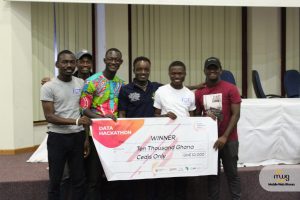The Data Upload Challenge and Hackathon was organized by Mobile Web Ghana with support from the Ministry of Communication through its implementing agency, National Information Technology Agency (NITA). The event forms part of the ongoing Ghana Open Data platform revamp project being run by SBC4D and Mobile Web Ghana (which is the local representative of the implementers).
Prior to this event, there have been a series of training sessions organized for members of staff of some government Ministries Departments and Agencies. These training sessions are all included in the revamping process of the Ghana Open Data Portal. The focus of the trainings was to make the participants familiar with the concept of Open Data, its impact and the how it has helped birthed some innovations in other parts of the world. Also, participants were taken through sessions on how to publish data on the newly revamped Ghana Open Data Portal. The goal is to build their capacity so they can upload data from their various institutions onto the platform. This necessitated the organization of a 4-day event where government agencies could upload their data onto the portal, interact with software developers, data scientists etc. so they can develop some data and software products that can help solve problems in the various sectors of the economy.
The Data Upload Challenge took place over the first 2 days and the hackathon followed for the next 2 days. The event was well attended by people from the software developers community in Accra, University students, data scientists etc. The government institutions which were represented throughout the event were Ghana Investment Promotion Commission, National Development Planning Commission (NDPC), Energy Commission, Registrar General’s Department, Lands Commission, Ghana National Petroleum Commission, National Road Safety Commission and Ministry of Agriculture. The representatives of these various institutions took part in the Data Upload Challenge, with the exception of those coming from GNPC, NDPC, Lands Commission and NRSC. Some journalists from Ghanaian Times, Atinka fm and Citi fm also graced the occasion to report on the event to their audience.

Fig. 1 Mr. Eric Akumiah presenting
Activities of the first day began with a presentation by Mr. Eric Akumiah. He shared the history of the open data movement in Ghana, the impact it has made and the desired impact NITA expects it to make through the revamping process it is undergoing. His session was followed by a series of presentations, one of them being a brief revision of the process of publishing data onto the portal. Next, the ‘tech guys’ (made up of software developers, data scientists etc.) got the opportunity to interact with the government institutions. This session was both important to the government institutions and the ‘tech guys’ in the room. This is basically because, the government institutions were looking forward to seeing the numerous innovations that could be developed by the tech guys based on the data they upload to the portal. Also, the ‘tech guys’ benefited from that interaction in this way: they had the opportunity to do a data assessment of the institutions, find out problems they face, assess use cases etc. All this pointed to the hackathon which was going to start on the third day.
On the second day, the government institutions started uploading their data onto the open data portal. The day began with a recap of the process of uploading data onto the portal and the standard all institutions are supposed to adhere to while making their data freely accessible to all. First of all the data has to be in a machine-readable format and preferably saved in a CSV format. The representatives of the government Ministries, Departments and Agencies spent the whole day uploading their data. Throughout that whole time, the ‘tech guys’ were also developing their ideas.
On the third day, prizes were presented to the MDAs who uploaded their data onto the portal. At the end of the day, all of the MDAs walked away with a prize. Right after that, the hackathon began. The participants began breaking into their groups and they started working on their projects. From then on until the following day, the teams worked both night and day to see their ideas become either finished products or prototypes. All this while, the representatives of the MDAs were always around to offer guidance throughout the process.

Fig. 3 & 4 Participants at working on their projects at the hackathon
The hackathon continued on the fourth day. There was no opening address from any personality; when the ‘tech guys’ got to the venue they immediately went on to work on their projects. A couple of them even spent the night at the venue to work extensively. All the work came to a stop a little after 4 pm. The presentations from all 18 teams (and individuals) were very impressive. We had some teams developing web application that could help visualize agric data and give users insights. Others developed dashboards that could help users have a graphical representation of their data thereby giving them deep insight. A few other groups presented mobile applications and others used predictive modelling in their products to project future trends and events. It was fascinating to see the innovative work that the teams had done over 2 days and how much they used open government data to achieve their goal of solving problems.


Fig.5 Winners of the Data Hackathon Fig.6 The winners of the Data Upload Challenge
At the end of the event, Waste to Gold was adjudged the best project of the day. The team’s idea borders on creating a platform for people to trade their waste for money. In second place was Sash, a team of software developers, data scientists etc. They developed a dashboard that gives users a visual representation of agriculture, health and registered business in Ghana. In third place was Agro IQ. they also developed a dashboard that gives users insight into agric data and also gives them the opportunity to make predictions.

